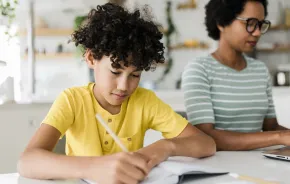Go-getter: (noun) Courageous, persevering, creative, expressive, generous preschooler with infectious self-love. Champion.
I want one of these! How do I make one?
According to many parenting books, the most surefire way to create a go-getter is to build my child's self-esteem. Prime it from the moment she is born, nurture it throughout childhood, prod it during adolescence, and then keep stoking it, well, forever.
What is self-esteem? The elusive pet concept of seemingly every child development expert is defined alternately as "confidence," "inner-contentedness" or, as Patricia Berne and Louis Savary say in their book, Building Self-Esteem in Children, "the ability to see oneself as capable and competent, lovable and loving, unique and valuable."
Pat Durbin, a 14-year instructor of preschoolers at Able Child Children's Center in Seattle, says self-esteem is anything but a cookie-cutter quality. "It shows in different ways with different children," he says. "It has to do with pursuing interests confidently and not being undone by failure."
In Durbin's opinion, the best way to boost young children's confidence -- and to stroke their inner go-getter -- is by doing two things:
Pay attention.
Avoid judging.
"Just paying attention to kids is an incredibly strong self-esteem builder," Durbin says. "So, when they show you the painting, don't just say, 'It's pretty.' Notice the colors and provide a simple description. There's no judgment needed."
Durbin takes the same approach when he supervises children's social interactions. When they have a run-in, he voices his observations and asks the children individually how they think they can solve the problem. This allows them to use their existing social skills and build upon them, then revel in the glory of a problem solved. Next time, the children are more likely to take their problems on themselves, without prompting. No praise necessary.
And that raises the prickly question of praise. Durbin and many authors on early childhood education are rethinking their notions of praise, regarding it as a form of judgment.
"Praise can undermine children's self-sufficiency, which is an important part of self-esteem," says Durbin. "Just looking and letting them know you're looking is the most important thing you can do, toward any accomplishment."
Competence begets confidence
In his article, "Are We Raising Helpless Children" (Parents magazine, April 1998), writer James Tobin argues: "In the long run, only those children who learn through experience that they really can handle the tasks of everyday life -- at home, in school, in the community, and in relationships with others -- can possess true confidence in themselves."
To instill competence in young children, Tobin suggests parents teach practical rather than purely "enrichment" skills. Offer simple thanks for favors and chores accomplished. Encourage calculated risk-taking for practice dealing with failure. Share some tasks with children. And finally, provide kids with plenty of opportunities to handle tasks on their own.
Some activities that can help stockpile preschoolers' competence and confidence:
- Caring for and playing with pets.
- Using tools.
- Planting and maintaining a garden.
- Connecting with friends and community.
- Managing responsibilities, including sibling care.
- Providing an opinion.
- Being quoted.
- Making and giving gifts.
- Opening mail.
- Dictating a letter to Grandma.
- Telling a story.
- Making others laugh.
- Owning something.
- Explaining a game.
- Winning a game.
- Cracking eggs.
- Spreading peanut butter
You get the idea. Importantly, what boosts one child's self-esteem doesn't necessarily boost that of the next child. Caregivers should take stock of their kids' strengths and sensitivities, and nurture them accordingly.
Personally, I enjoy noticing my children's unlikely triumphs. One time, my 4-year-old daughter stumbled off a balance beam and got right back up. For this, I rewarded her with a new leotard she had been asking for. I also told her my view of sports: That the most important thing you can do is get up and try again.
Guilty of being human?
Parents all make mistakes. Luckily, children are resilient and forgiving. Any time we end a challenging day flustered and wake up the next day with a fresh burst of enthusiasm, we're modeling "overcoming failure."
That said, here are some self-esteem hindrances to avoid:
- Over-direction. Children should be allowed to take initiative in their activities and problem-solving.
- Criticism, scolding, shaming.
- Neglect, exclusion.
- Comparisons to siblings or peers.
Today, I yelped at my daughter for messing up a fort I built for her. (A low parenting moment, to be sure.) But then I composed myself. I reminded myself that a floppy tent is still a tent, that my daughter is still 4, and that I am still learning how to be the parent who creates the go-getter.
Natasha Petroff is a Puget Sound-based writer and mother.
Self-esteem resources for preschoolers
Articles:
- "Can You Praise Children Too Much?" by Marilyn Lopes, National Network for Childcare: www.nncc.org/Guidance/can.praise.much.html
- "Helping Your Child DevelopSelf-Esteem", Child Development Institute: http://childdevelopmentinfo.com/parenting/self_esteem.shtml
- "How Can We Strengthen Children's Self-Esteem?" by Lilian Katz, KidSource Online: www.kidsource.com/kidsource/content2/strengthen_children_self.html
Books:
- Boost Your Child's Self-Esteem: Simple, Effective Ways to Build Children's Self-Respect and Confidence, Karin Ireland
- Building Self-Esteem in Children, Patricia H. Bern and Louis M. Savary
- Hearing Is Believing: How Words Can Make or Break Our Kids, Elisa Medhus, M.D.
- Raising Happy Kids, Elizabeth Hartley-Brewer
- Raising Confident Girls, Elizabeth Hartley-Brewer
- Raising Confident Boys, Elizabeth Hartley-Brewer
Children's Books:
- Girls Hold Up This World, Jada Pinkett Smith
- I Like Myself! Karen Beaumont
- Incredible Me! Kathi Appelt
- It's Okay to Be Different, Todd Parr
- Pretty Brown Face, Andrea and Brian Pinkney
- Sassafras, Audrey Penn
- You're All My Favorites, Sam McBratney
Kids' DVD:
- Free to Be You and Me, produced by Marlo Thomas and Carole Hart









